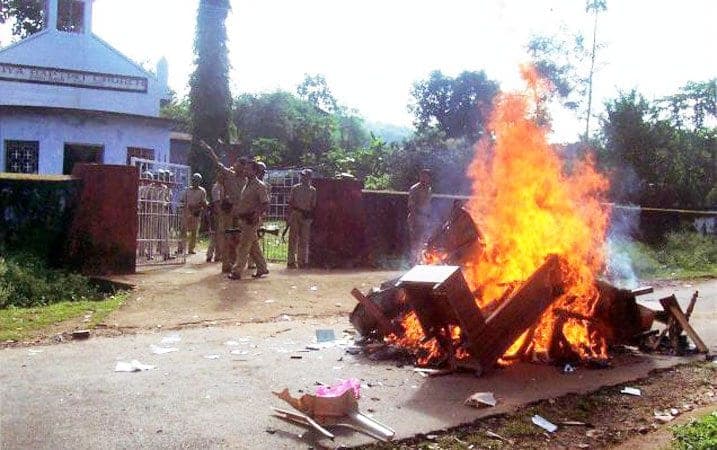One of seven Christians convicted in 2008 for allegedly killing a Hindu holy man in the Indian state of Odisha, a charge that triggered a bout of anti-Christian violence that left 100 dead and 50,000 homeless, walked out of prison on March 31 accompanied by family members.
It’s widely believed among India’s Christian community that the 2008 convictions were unjust, a way of distracting attention away from the failure of Odisha authorities in tandem with militant Hindu movements to protect the Christian minority.
An Odisha High Court granted interim bail to Gornath Chalanseth, 42, for three weeks to attend to his ailing wife, but it took nine days for the legal formalities to be completed.
“This gives a glimmer of hope to my own struggle for justice,” said Servite Sister Meena Barwa, who was raped during the August 2008 violence in Kandhamal, a district in Odisha.
“Sustainable peace in Kandhamal depends on justice,” Barwa said, “and we must continue our struggle for justice even in the face of hostilities and intimidation. While it’s only interim bail for three weeks, yet, it brings me hope that I too will receive justice.”
Chalanseth and his fellow defendants were convicted under a “fast-track” legal process for the murder of Vishwa Hindu Parishad leader Laxmanananda Saraswati and his four disciples in August 2008.
“This is a very positive signal, importantly, innocents cannot be incarcerated with culprits for eternity, we are hopeful for our other cases, and we will not lose hope,” said Archbishop John Barwa, leader of the Archdiocese of Cuttack-Bhubaneswar and Sister Meena’s uncle.
“Easter is a celebration of Hope, and this encourages us that there is hope at the end of the day. Truth will prevail and Truth will set us free,” said Barwa, who had just returned from the funeral of a priest who died suddenly of cardiac arrest.
Father Ajaya Kumar Singh, a Catholic priest who heads the Odisha Forum for Social Action told Crux that this is a shot in the arm for other falsely accused in the murder case.
“This is the first bail in the Laxmanananda Saraswati murder case, and it is the first time in seven years that an innocent accused is getting interim bail,” he said.
“I am hopeful, that now there is some chance that the others too, may be granted bail, or at least interim bail,” Singh said. “If one of the innocent accused are out on interim bail, we can hope that it can be a precedent of securing permanent bail for our other Christians as well.”
The murder of Laxmanananda Saraswati in his Jalasapata Ashram in Kandhamal on August 23, 2008 trigged large-scale violence on the Christian tribals and dalits, members of Indian’s underclass, that lasted several weeks.
Although Maoists in the state claimed responsibility for the killing, Hindu-affiliated groups carried out a well-orchestrated rampage that left over 100 Christians dead, destruction of around 8,500 homes, the torching and destruction of nearly 395 churches, the displacement of 56,000 Christians, and at least two cases of sexual assault.
In the wake of the attacks, nearly 100,000 Christian children in the area dropped out from school.
According to Singh, the prospects for change in the area are “bleak and grim,” arguing that not only was the violence sectarian in nature, but the failure of the justice system continues to reflect the power of radical Hindu outfits in the state.
Of 3,232 complaints lodged by Christian victims, only 825 reports were actually filed by the police and only 605 led to charges. Of those, 302 cases were dismissed for lack of evidence. Of the most serious charges, 33 of 35 murder vases were dismissed.
Some 11,000 rioters named in the complaints were granted bail and remain free, while 3,254 persons were fully acquitted due to the arbitrary closing of cases.
To date, there have been convictions in only two murder cases arising from the Kandhamal violence, and while ten of those convicted have been given life sentences, they are all out on bail.














